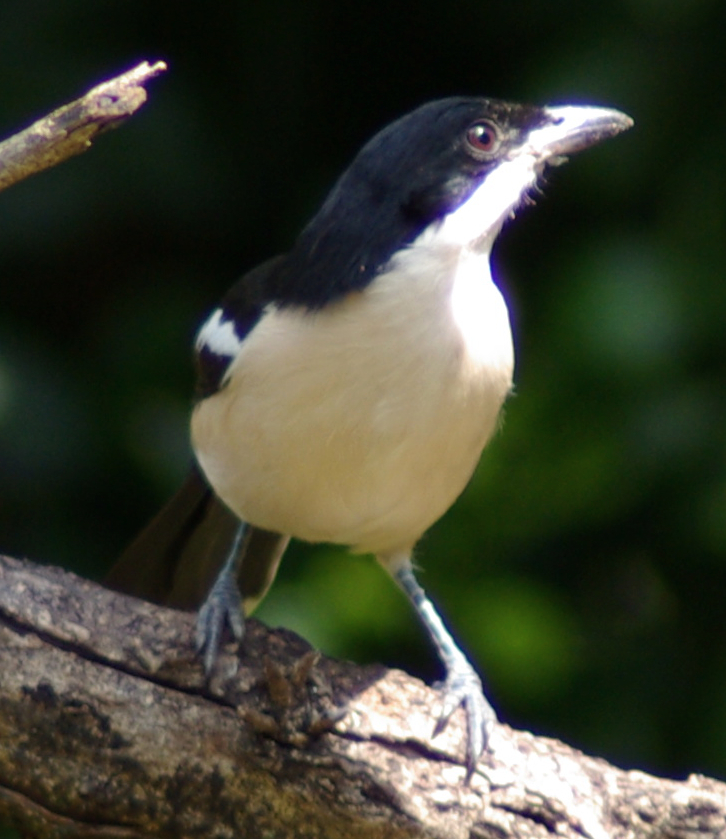Tropical Boubou
From Wikipedia, the free encyclopedia
[Photo] Adult Tropical Boubou, Laniarius aethiopicus major, Mara Serena Lodge, Kenya. Date June 28, 2007. Author Jerry Friedman http://commons.wikimedia.org/wiki/User:JerryFriedman
The Tropical Boubou is a medium-sized passerine bird of sub-Saharan Africa.
Range and Habitat
The Tropical Boubou occurs from about 10° North to the Limpopo River in South Africa, except in arid regions and dense forests, notably including the equatorial rain forest. On the Atlantic Coast it is found only to 5° N. Only local seasonal movements are known, and only from Kenya and Ethiopia.
It requires cover, and is found in a variety of forest and forest-edge habitats, including savannah woodland. In the drier parts of its range, the only suitable habitat is riparian forest.
Description
The Tropical Boubou is fairly large for its family (bushshrikes), being 23 to 25 cm long and 50 to 66 grams in weight. The adult's upperparts and tail are glossy blue-black except for white spots on the rump, visible when the wings are spread and the rump feathers are erected. The underparts are white with a buffy or pinkish tinge on the breast and flanks, not always noticeable except in good views. The bill is black; the eyes are dark reddish-brown. The wings have white markings that vary, depending on subspecies, from a stripe formed by the median and greater coverts and the edges of the inner secondaries to no white. The tips of the outer tail feathers can be white in some subspecies. There is an all-black morph in a small area of coastal Kenya. Juveniles are similar but duller, with a greyish brown bill, the upperparts mottled by yellowish-ochre to tawny feather tips, and dusky-barred flanks.
This species is heard more often than seen. Resonant, flute-like whistles are typical, and sounds represented as bou or boubou give the bird its name. Like many bush-shrikes, it has a wide vocal repertoire that includes duets in which two individuals (a male-female pair or two males with adjacent territories) give notes alternately in so rapid a sequence that they sound like one bird???indeed a bird that has lost its mate can make the same sequence that a pair would make. Males probably start most duets, and their notes include low-pitched whistles and harsh croaks; females' notes include higher whistles and "harsh tearing or rattling sounds". Harris and Franklin give examples of typical duets, including ho-ho-u-ho, bobobobo-Weeer, and haw-Weeer-haw. Northern birds give more whistles, which are more resonant, and southern birds give more croaks. Other harsh calls are given in aggression, courtship, alarm, and roosting.
Trios are common, especially involving young birds learning to sing. This species may duet with the Slate-colored Boubou.
Feeding
The Tropical Boubou usually forages alone on or near the ground. It takes many kinds of large insects, other arthropods, and small mammals, reptiles, and amphibians. It often robs other birds' nests and occasionally eats snails and fruit. It holds large prey down with its foot while eating. Like other bush-shrikes (and true shrikes), it impales prey on thorns to eat later. It also wedges prey into crevices.
Reproduction
This species is monogamous. Courtship includes the male chasing the female, the two hopping together through branches, the male bobbing its head and bowing, and the male making display flights with the white rump spots exposed, all accompanied with various calls.
Both sexes build the nest, but the female does more of the work. It is a cup of twigs, tendrils, and small roots held together with spider web; the walls are thin enough to see through. It is placed at varying heights, but typically about 3 m, in a bush, in a horizontal fork or in vegetation climbing or parasitic on the bush. The female lays three or less often two eggs, which are bluish to buffy green with brown and lilac spots.
Again both sexes incubate, but the female does most. The eggs hatch in about 15 days. Nestlings fledge after a similar period. Both sexes feed the young until they can feed themselves, after about seven weeks; they stay with their parents for about five months.
This species hybridises with the Southern Boubou in the south and possibly with the Swamp Boubou in the west.
In one study, Black Cuckoos parasitised 2.1% of nests, sometimes parasitising the same pair several times in a season. Tropical Boubous mob Black Cuckoos.
Longevity
A ringed bird lived nine to ten years. Little is known about predation.
Subspecies
There are seven (or more) subspecies. The most widespread subspecies is L. a. major, found from Sierra Leone to Sudan, the southern Congo basin, and Angola. The nominate subspecies is found in Ethiopia, Somalia, and northern Kenya. L. a. ambiguus is found in the highlands of Kenya and northeastern Tanzania. L. a. erlangeri, of southern Somalia, is similar but smaller. L. a. sublacteus, with the least white in the wings (sometimes none), is found in coastal Kenya, and Zanzibar. This is the subspecies in which an all-black morph occurs in the area around the lower Tana River and Lamu Island. Only major, sublacteus, and ambiguus ever show white-tipped outer tail feathers. L. a. mossambicus occurs in the southern Democratic Republic of the Congo, eastern Zambia, and Mozambique; it is smaller and buffier below than the northern subspecies. L. a. limpopoensis of southern Zimbabwe, northern South Africa, and western Mozambique is the buffiest of all, without pink tones.
http://en.wikipedia.org/wiki/Tropical_Boubou
| The text in this page is based on the copyrighted Wikipedia article shown in above URL. It is used under the GNU Free Documentation License. You may redistribute it, verbatim or modified, providing that you comply with the terms of the GFDL. |
|

